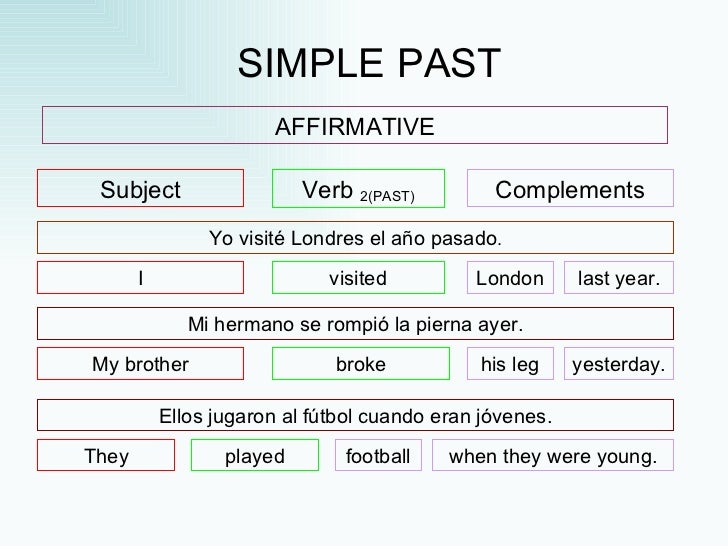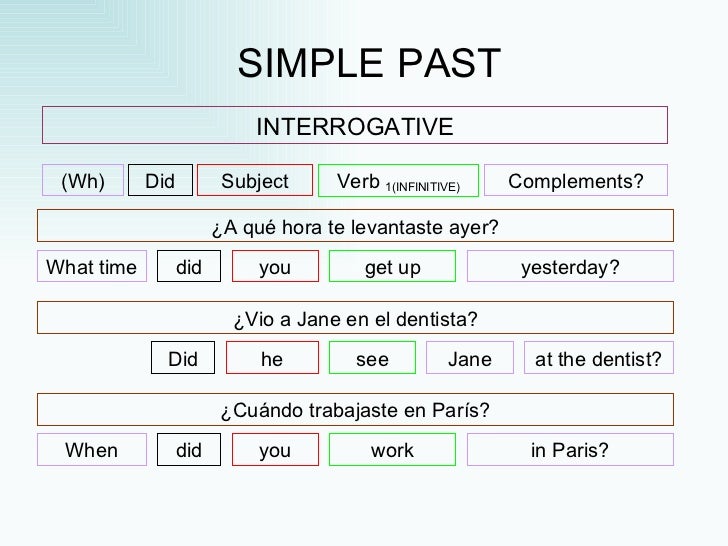SIMPLE PAST
El "simple past"
se utiliza para hablar de una acción que concluyó en un tiempo anterior al actual. La duración no es
relevante. El tiempo en que se sitúa la acción puede ser el pasado reciente o
un pasado lejano.
EJEMPLOS:
·
John Cabot sailed to
America in 1498.
·
My father died last
year.

Siempre se utiliza el "simple past" para referirse
a cuándo ocurrió algo, de modo que va asociado a ciertas
expresiones temporales que indican:
·
Frecuencia: often,sometimes,always
I sometimes walked home at lunchtime.
I sometimes walked home at lunchtime.
·
un tiempo determinado: last week, when I was a child,
yesterday, six weeks ago
We saw a good film last week.
Yesterday, I arrived in Geneva.
We saw a good film last week.
Yesterday, I arrived in Geneva.
·
un tiempo indeterminado: the other day, ages ago, a long time ago People lived in caves a long time ago.
She played the piano when
she was a child.
AFIRMATIVA Sujeto
+ verbo principal…
La forma afirmativa del "simple
past" es sencilla.
- I was in Japan last year
- She had a headache yesterday.

NEGATIVA
Sujeto
+ “to be” + “not”…
Sujeto
+ verbo auxiliar (to do) + “not” + verbo principal (en infinitivo)…
INTERROGATIVA
To be” + sujeto…?
To be” + sujeto…?
Verbo auxiliar (to do) + sujeto + verbo principal
(en infinitivo)…?
Para
las formas negativa e interrogativa del "simple past" del verbo "do" como
verbo ordinario, se emplea como auxiliar "do", e.g. We didn't do our homework last night.
La forma negativa del verbo "have" en "simple past" suele construirse utilizando el auxiliar "do", aunque en ocasiones solo se añade not o la contracción "n't".
La forma negativa del verbo "have" en "simple past" suele construirse utilizando el auxiliar "do", aunque en ocasiones solo se añade not o la contracción "n't".
- We didn't have time to visit the Eiffel Tower.
- We didn't do our exercises this morning.


SIMPLE PAST": VERBOS IRREGULARES
Algunos verbos hacen el "simple
past" de forma irregular. Estos son los más comunes.

TO GO
- He went to a club last night.
- Did he go to the cinema last night?
- He didn't go to bed early last night.
TO GIVE
- We gave her a doll for her birthday.
- They didn't give John their new address.
- Did Barry give you my passport?
TO COME
- My parents came to visit me last July.
- We didn't come because it was raining.
- Did he come to your party last week?
No hay comentarios:
Publicar un comentario